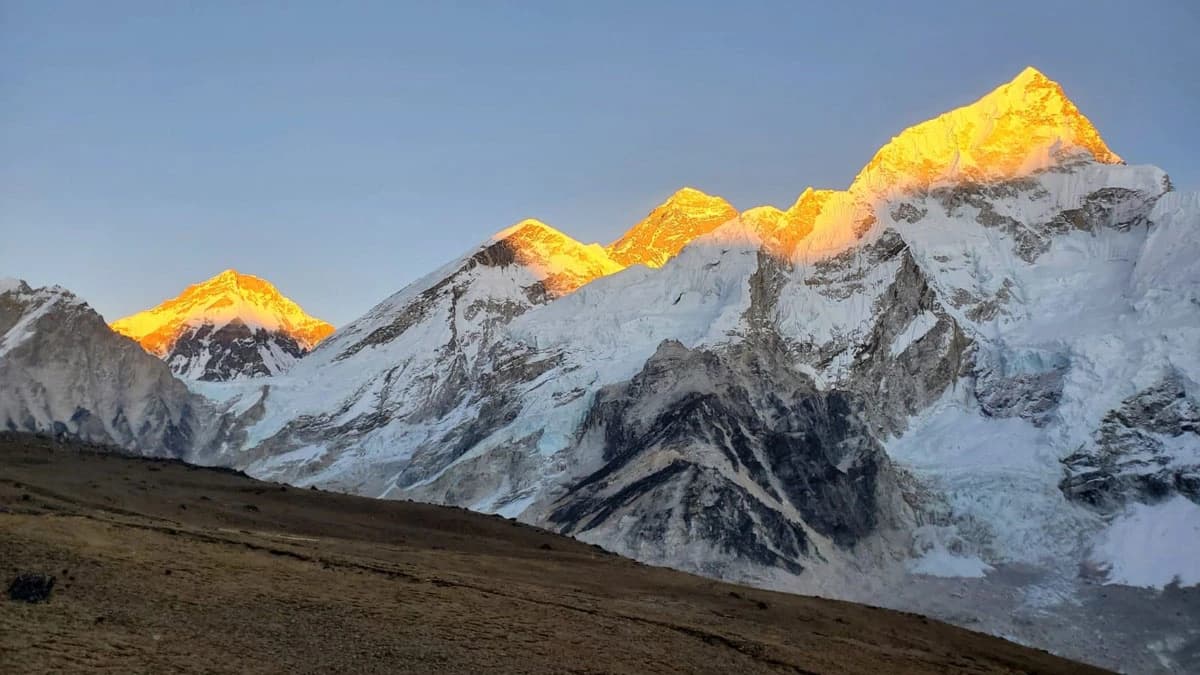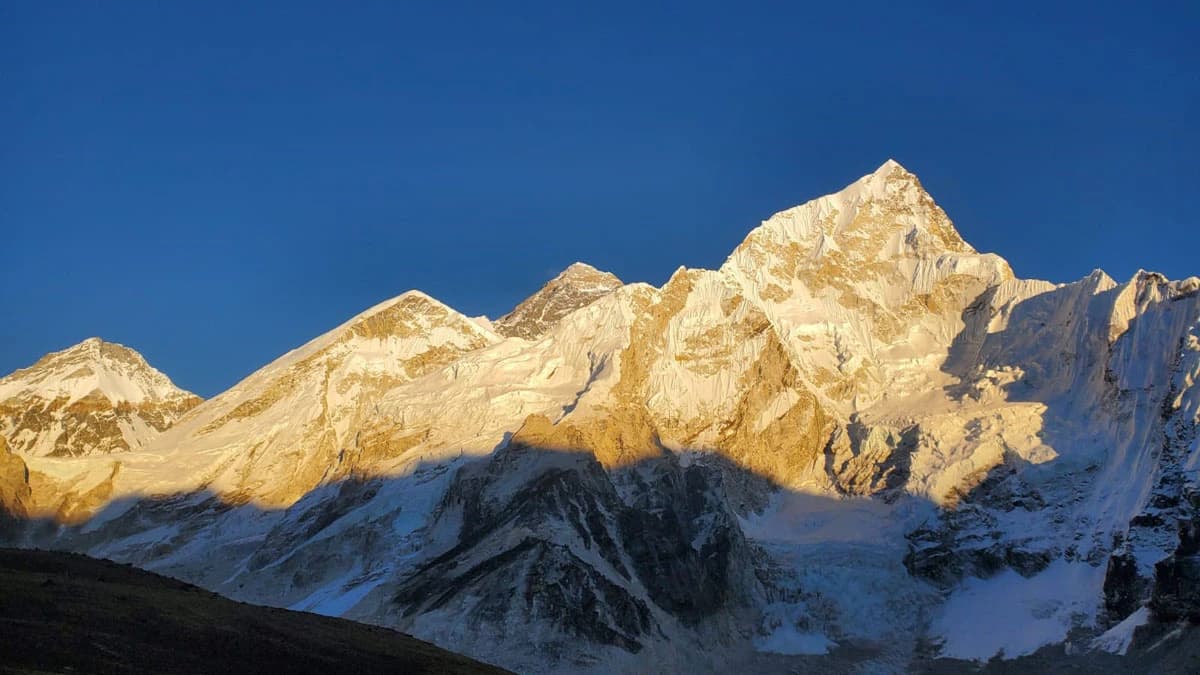Everest Base Camp Trek for Teen and Young Trekkers is designed to motivate teens (ages 14+) and young adults. This structured program combines adventure with leadership development, cultural exchange, and environmental stewardship in the Himalayas. Under the guidance of certified trekking guides, professionals and educators, participants engage in transformative journey that prioritizes safety, team work, and ethical exploration. This trek lets young trekkers to learn practical skills such as risk management and decision making through real world challenges.
The trek to Everest Base Camp for young trekkers and teen fosters cross-cultural engagement through immersive interactions with Sherpa communities in Khumbu region. It includes guided village visits, traditional homestays, and discussions on local traditions and sustainability. Leadership workshops are integrated daily, focusing on resilience, group dynamics, and problem solving. It is contextualized by the demands of high altitude trekking. Environmental responsibility is a core pillar, with hands on participation in UNESCO backed initiatives like trail conservation and waste management education.
The trek to EBC offers educational components for young and teen trekkers. Participants get a chance to study and explore glacial systems, microclimates, and impacts of climate change on Himalayan ecosystem. It offers a chance to explore Sherpa history, Buddhist influences and modern socio-economic shifts in Khumbu valley.
The Everest Base Camp Trek is an iconic adventure that combines physical challenge, cultural immersion, and awe-inspiring natural beauty. This trek can be done by young and teen trekkers. Trekking to Everest Base Camp offers unparrelled views world’s highest peaks including Mt. Everest, Lhotse, and Ama Dablam. This exciting journey is more than a trek, it’s a carefully crafted experience that balances exploration with education, fostering resilience, cultural, understanding, and environmental awareness.
Highlights during this Teen Age EBC trek
- Explore the culture and tradition of Sherpa people.
- Trekking to the base of highest mountain in the world.
- Explore Khumbu Glacier and Khumbu icefall.
- Experience the thrill of mountain.
- Climb up to the kalapatthar which is one of the main view point of Mt. Everest.
- Explore one of the largest monastery (Tengboche monastery) of the Everest region.
What to expect as a teen and young trekker during Everest base camp trek?
Physical and Mental Challenges
Trekking to Everest Base Camp (EBC) is an unforgettable adventure, especially for young trekkers eager to challenge themselves and soak in Nepal’s stunning landscapes. Here's what to expect on the Young Focus EBC Trek.
The trek isn’t a race, but it’s no walk in the park either. Days involve 5–7 hours of hiking, with steep climbs, rocky trails, and occasional icy patches. Your legs might feel like jelly by afternoon, and altitude can hit hard causing you headaches or shortness of breath. Staying mentally positive is key. Pace yourself, take breaks, and enjoy the views instead of rushing. Youthful energy helps, but overconfidence can lead to burnout or altitude sickness.
Trails and Scenery
You’ll pass through colorful Sherpa villages like Namche Bazaar and Tengboche, where prayer flags flutter and tea houses offer warm welcomes. The trails mix forested paths, suspension bridges over roaring rivers, and wide-open valleys with jaw-dropping views of peaks like Ama Dablam. Every day brings new landscapes, so keep your camera handy.
Altitude Adjustments
As you climb higher (EBC sits at 5,364m), the air gets thinner. Even if you’re fit, altitude sickness can creep up. Listen to your body as hydration and rest days are non-negotiable. Acclimatization stops in villages like Dingboche let your body adapt. Don’t ignore symptoms and inform your guide immediately as they are trained to help if things get rough.
Teahouse Life
Accommodation is basic but cozy. Teahouses offer shared rooms with twin beds and thick blankets (bring a sleeping bag for extra warmth!). Meals are simple dal bhat (rice and lentils), noodles, and pancakes to fuel your trek. Evenings are for swapping stories with fellow trekkers over tea or hot chocolate.
Weather Surprises
Mornings are crisp and sunny, but afternoons can bring wind or snow, even in popular seasons (spring/autumn). Layers are your best friend pack thermal wear, a down jacket, and a waterproof shell. Nights get freezing, so pack warm socks and a good hat.
The Reward
Reaching EBC feels surreal. You’ll stand in the shadow of Everest, surrounded by glaciers and mountains. The final push to Kalapathar (5,645m) for sunrise views is tough but worth every gasp. The pride of finishing, coupled with friendships formed on the trail, stays with you long after you descend.
Challenges and difficulties for teens and young trekkers during Everest Base Camp Trek
Everest Base Camp is a dream for many, but teens and young adventurers often hit unexpected roadblocks. As this trek is famous and rewarding it is also demanding and more challenging. Let’s start with altitude. Even if you’re in great shape, the thin air at higher altitude makes your journey more difficult. Headaches, nausea, or feeling wiped out can creep up fast. Young hikers, might brush off these signs, thinking, “I’ll tough it out.” But altitude sickness isn’t a joke. Without taking acclimatization days seriously or knowing when to turn back, things can spiral like fluid buildup in the lungs or brain. It’s scary, and pride can make it worse.
Then there’s the physical grind. Days are long, trekkers need 5 to 8 hours of hiking over uneven trails, day after day. Teens might think, “I’ve got energy for days!” until reality hits. Backpacks feel heavier by the hour, knees ache on descents, and the cold makes it even worse. Even small things like blisters or dehydration can turn into big problems if ignored. And organizing gear is another thing that matters if you pack flimsy sneakers instead of boots or a thin sleeping bag with frostbite or hypothermia becomes a real risk.
Prepare yourself for no Wi-Fi, no cozy bed, and very simple meals. For a generation glued to screens and instant comfort, the isolation hits hard. Group tensions flare, and the pressure to keep pace with others can mess with your head. Boredom during rest days or anxiety about the next climb can chip away at motivation. Staying positive becomes as crucial as staying hydrated.
Preparation is another weak spot. Many young trekkers wing it. They’ll skimp on gear to save cash, not realizing a cheap jacket won’t cut it at -10°C. Some skip hiring guides, thinking, “I’ll just follow the trail,” only to get lost or miss warning signs of altitude sickness. Then there’s the food and water whereas stomach bugs are common, and without knowing how to treat basics like diarrhea, a minor issue can ruin the trip.
And let’s talk emergencies. If something goes wrong, help isn’t around the corner. Helicopter rescues cost a fortune and depend on clear skies. Medical clinics are rare and basic. Many young travelers don’t bother with travel insurance or don’t know how to handle a crisis. Plus, cultural slip-ups, like ignoring local customs can strain relationships with guides or villagers.
The EBC trek isn’t just about fitness or guts. It’s about humility, knowing when to slow down, listening to your body, and respecting the mountain. Teens and young hikers who balance their excitement with patience and prep often walk away with unforgettable stories.
Why We're the Best Choice for Teen and Young Trekkers on the EBC Trek
Choosing Regal Nepal Treks and Expedition for your Everest Base Camp (EBC) trek for teen or young trekker means, teaming up with a crew that’s got your back while letting you own the adventure. Here's what makes us better than other providers:
Safety is our top priority
Altitude sickness can sneak up on anyone, especially when you’re young and eager to push limits. Our guides are experts at spotting early warning signs like headaches, dizziness, fatigue, and will make you slow down, even if your adrenaline says otherwise. We design itineraries with built-in acclimatization days that let your body adapt without killing the fun. Plus, we carry emergency oxygen, first-aid kits, and have rock-solid evacuation plans.
We understand your spirit
Young trekkers often underestimate the grind and long days on rocky trails, freezing nights, and the urge to pack everything but the kitchen sink. That’s why we lighten your load with porters, so you’re not hauling a 20kg backpack. Our gear advice is legendary: no vague tips, just straight-up wisdom on the best boots, and warm sleeping bags.
An exciting and memorable adventure
We know you want epic views and laughs with peers. That’s why we often group younger trekkers together so, you’ll bond over shared stoke (and shared exhaustion). Boring rest days is not on our watch. Our guides spice things up with wild mountain tales, Nepali slang lessons, or late-night card games in cozy tea houses
We take care of the details.
We take care of all the tedious tasks like permit checks and route planning. Plus, we provide helpful tips on cultural etiquette. We take care of logistics so you’re not stuck arguing with a checkpoint officer. We’ll also guide you on local customs (like why tipping your porter matters) and steer you toward safe food spots. Stomach issues is more likely to be minimized as our guides know which tea houses won’t wreck your trip.
Budget-friendly, with no hidden costs.
We get that young adventurers want to save cash, but cutting corners on safety is a no hard . Our packages include permits, experienced guides, porters, and descent lodging. We even hook you up with affordable gear rentals in Kathmandu so you’re not blowing cash on gear you’ll use once.
Acclimatization or rest day
If you need an extra rest day, we’ll adjust the plan. Crave more challenge We’ll add detours like Kalapathar’s sunrise hike. Our guides aren’t just trail experts; they’re your hype squad, cheering you through the toughest stretches.



